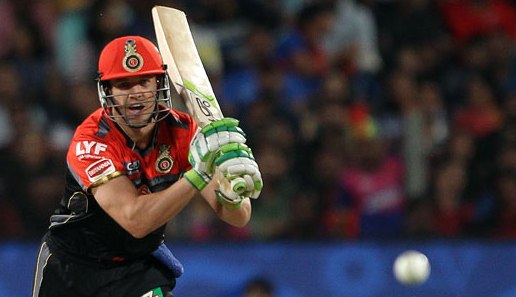The success of AB de Villiers on the commercial T20 circuit is due to the acceptance of failure.
That is the view of Rahul Dravid, who said that while De Villiers was a batsman of ‘rare gifts’, he had gained from the freedom to experiment.
‘Batsmen in domestic T20s had the freedom to develop and team management were more accepting of failure in the T20 format than in any other,’ said Dravid.
Speaking on the ESPNcricinfo Talking Cricket programme, Dravid said that De Villiers ‘had so many opportunities to fail, to learn from them and to keep refining his batting technique for T20.’
Dravid added: ‘Apart from the IPL, he gets other opportunities to practise and experiment with that, and if you keep trying something and you keep failing and learning from it, you are going to get better at it, and that’s what happened with batting techniques. People have been allowed to take a few more risks. They keep doing that over and over again and they get better and better at it.’
De Villiers has come under scrutiny for the fact that he excels in commercial T20s, yet underperforms in national colours. The focus recently has also switched to the coaching staff and their ability to get the best out of their players.
Dravid said that in domestic T20s, batsmen feel increasingly secure about playing risky shots such as reverse sweeps and paddle sweeps because a dismissal caused by such shot selection isn’t frowned upon. He also highlighted how this freedom to ‘practise and experiment’ with shots has made batsmen get much better at executing them in match situations.
‘We are more accepting of failure, I think, in T20 cricket than we are in any other form of the game,’ Dravid said. ‘When a batsman takes risks and plays a paddle sweep or a reverse sweep or all the kinds of shots that they play, you’re more likely to view it with a certain degree of acceptance than you would, say, in a Test match or in one-day cricket. This has given batsmen freedom to experiment with these things more and they’re getting better and better at it.’
Dravid, a former India captain who has been involved with the IPL as a player, captain and team mentor over the last nine years, believes that while skill sets have improved dramatically over this time, the batsmen are ahead of bowlers on the curve. Bowlers, he says, are are restricted by the amount of time they can spend on honing their skills in practice as compared to batsmen.
‘I see that as one of the major challenges of T20 cricket. What we don’t want is every score to become a 200, 200-plus score, where it’s always about power-hitting skills.
‘We want to bring the skills of cricket. We want somebody to negotiate a difficult spell, you want to see someone’s ability against the turning ball and how he negotiates that and how he’s still able to score at 7-8 runs an over. Otherwise you just might put up bowling machines and see who hits it further.’







